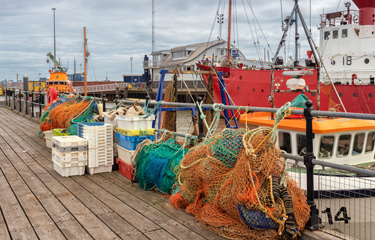Some of the latest ratings provided by the Marine Conservation Society (MCS) Good Fish Guide have drawn criticism from the U.K. seafood industry, with a number of popular varieties being added to its “Fish to Avoid” list.
While herring and sardines have joined the guide’s “Best Choice” list alongside mackerel and some tuna, monkfish from the North Sea and west of Scotland has been categorized as a “Fish to Avoid,” as has some Scottish brown crab and lobster, with the charity citing that population levels were “suffering across the board, largely due to poor management, with no catch limits in place.”
Good Fish Guide Manager Charlotte Coombes said that with 141 “Best Choice” seafood options, there is plenty for U.K. consumers to choose from to support sustainable fisheries.
“Disappointingly, all of the new U.K. ratings to the guide are either amber- or red-rated, with a total of 161 ‘Fish to Avoid,’” she said.
According to MCS, most skates and rays remain “Fish to Avoid” because they are vulnerable to overfishing.
In total, 14 different types of seafood were added to the avoid list.
However, U.K. public body Seafish suggested that some of the guide’s fishery ratings may be too severe.
“We acknowledge that sustainable fisheries management is vital to secure fish and shellfish stocks for future generations. Assessments like the Good Fish Guide are helpful to consumers, but they must be based on the most accurate and up to date information,” Seafish Director of Operations Aoife Martin said. “Our fisheries management team provided feedback to MCS on the proposed ratings. Now that the latest version of the guide has been released, and we can see the final scores we are concerned that some fisheries have been rated too harshly. We know that good work is already underway in the U.K., with industry stakeholders and regulators collaborating on the sustainable management of economically important shellfish and finfish fisheries. This includes the shellfish management groups, which bring together industry, government, and researchers, and various fishery improvement projects. The guide does not appear to take account of this activity and the positive impact it can have on stock sustainability.”
Scottish Fishermen’s Federation (SFF) Chief Executive Elspeth Macdonald is even more critical of the guide. She said the MCS does not hide its dislike of mobile fishing such as trawling, so its new ratings on species such as monkfish have not come as a surprise to the fishing industry.
“They are what we have come to expect from an organization that would prefer that wild-capture fishing didn’t exist, and campaigns endlessly to end what is a legitimate and highly-regulated means of food production.”
Macdonald said MCS’s ratings are based on information “cherry-picked to suit their narrative.”
“On monkfish, our industry fishes in line with ICES advice, which already has a precautionary filter, as it is classed as a data-limited stock. The MCS rating is based on a tiny snapshot from a much longer time series of data, showing that the monkfish stock is only fractionally below the long-term average and that action is being taken to improve the science and data that is needed for better understanding,” she said. “Scottish fish stocks are well managed. There has been a steady upward trend in sustainable fishing over the last 30 years by an industry committed to this for the long-term. Yes, there is more to do, but to demonize our industry and provide misleading information to the public is both unfair and unwarranted. Through their actions, MCS risk driving consumers towards foods that have a much greater environmental impact than low-emission, healthy and sustainable wild-caught fish. And in providing advice to the public that is misleading and is impacting on businesses operating entirely within the law, MCS will want to consider both the reputational and legal risks that brings.”
MCS has also confirmed that in collaboration with WWF and RSPB, it has created the Future Fisheries Alliance (FFA) project, which is calling for the U.K. government to strengthen the current draft of the Joint Fisheries Statement (JFS), which is due to be published at the end of the year.
In the final JFS, the FFA wants to see time-bound commitments to recover depleted stocks via effective ecosystem-based management; A firm commitment to the roll out of remote electronic monitoring (REM) with cameras; Urgent and effective action to tackle wildlife bycatch in U.K. waters; And a time-bound commitment from all administrations to set out a climate-smart fisheries strategy.
Photo courtesy of Chris Lawrence Travel/Shutterstock







